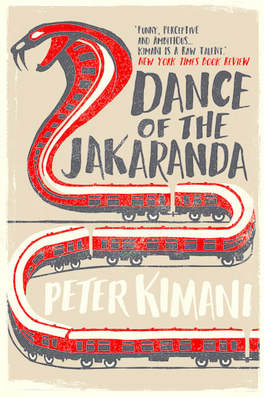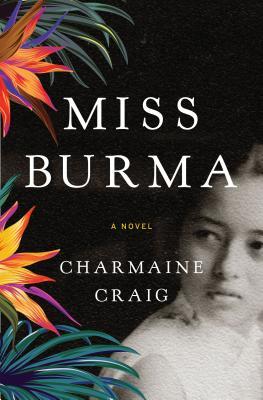Dance of the Jakaranda by Peter Kimani
Rajan falls for Miriam, a beautiful young woman who defies the rigid categories of race. But when he introduces her to his grandparents, Babu collapses in shock. His suspicions about her ancestry suggest the couple couldn’t possibly marry, even if Rajan hadn’t been betrothed at birth to the daughter of a friend from Punjab.
Questions of parentage and cover-ups first arise in the prologue when, on the train’s inaugural journey in 1901, McDonald peers through the window of a first-class carriage and coverts a piece of that beautiful land for his estranged wife. With him is Reverend Turnbull, respected more for his knowledge of cattle than in his official missionary role. Exactly what their conversation alludes to is part of the novel’s puzzle, but there is a clear parallel between the murky birth of the nation and at least one “illegitimate” child.
Like A Child Called Happiness and House of Stone, Dance of the Jakaranda tells the murky story of British colonialism in Africa and its aftermath. As in Zimbabwe, the colonisers used a mixture of trickery and violence to force the native people to work for them even as they usurped their land. As in Zimbabwe, blacks attacked white farms and farmers when the balance of power changed. The added dimension in Dance of the Jakaranda is the Indian community introduced as indentured labourers from another part of the British Empire, and a convenient scapegoat for both black and white.
Two things – tone and time – made me wonder at various points in my reading whether I was going to enjoy this novel as much as those on the bloody history of Zimbabwe. The tone is deliberately light, like a fairytale or satire, which occasionally upset my preferred balance of light and dark by veering into farce. Of course we might look back at the British Empire and conclude – despite the legacy of marvellous railways – the whole project was a farce, except that so many were sacrificed at its altar and its shadow won’t go away.
Tracing a hypothetical history between 1893 and 1963 – with an epilogue depicting how much of that history might have been embellished or forgotten as Nakuru thrives as a tourist destination – not directly like a railroad, but meandering like a snake, the novel’s temporal fluidity mimics McDonald’s at ninety-two (p285):
his mind occasionally melded memories of the past with the present, so any exploration of the present was a laborious reflection of the past as well. This train of thought, as it were, started and ended with the literal train that he had come to build.
Although sometimes lost in the temporal stew, when reminded of Jennifer Nansubuga Makumbi’s analogy of Frankenstein-like surgery for European colonisation and subsequent denigration of Africa in her debut novel Kintu set in Uganda, I came to the conclusion this was absolutely right. Psychologically or politically, if we’ve been deeply wronged, the past is the present, although history also teaches us we need to find some way to move beyond our grievances.
First published in the USA in 2017, my copy of Dance of the Jakaranda comes courtesy of UK publisher, Telegram.
Miss Burma by Charmaine Craig
With an existence defined by war, exile and reversals of fortune, fifteen-year-old Louisa is initially indifferent to her beauty. But becoming Miss Burma drags her into a world of celebrity, hypocrisy and artifice where the elevation of a young woman of mixed and maligned heritage (although identifying with the Karen, Benny has been brought up as a Jew) serves as a convenient mask for the racism and inequalities of the regime. Although pretence comes naturally – the vagaries of her parents’ marriage have seen to that – as, due to the Karen people’s oppression, does the concept of service, but will Louisa ever be free to choose her own path?
Through the trials of a single family, Charmaine Craig tells the story of contemporary Burma from the dying days of the British Empire, World War II and the Japanese occupation, denial of minority rights under the Burman nationalist government, to enduring civil war. With free speech denied under the dictatorship, and Western interference in internal affairs (initially the British reneging on their promise to support the cause of Karen self-government; later the Americans fighting communism at any cost), the opposition is forced underground.
Charmaine Craig’s second novel is based on the story of her mother and grandparents. For me, having met some Karen people in Northern Thailand in my travelling days, I appreciated the opportunity to learn more about their history and culture. But just as personal idiosyncrasy is a luxury when life becomes a battle for survival, politics take precedence over character in this novel, leaving me somewhat distanced from these lives.
It wasn’t until towards the end that I felt a genuine connection with the narrative in my gut rather than in my head, with this beautiful description of bearing the unbearable (p340):
She was an animal, just an animal. It was the mind, not the body, which was alien, the cause of torment. She had only to dwell – and keep dwelling every moment – in this animal self in order to go on.
Miss Burma is published by Grove Atlantic who provided my review copy.























 RSS Feed
RSS Feed





















